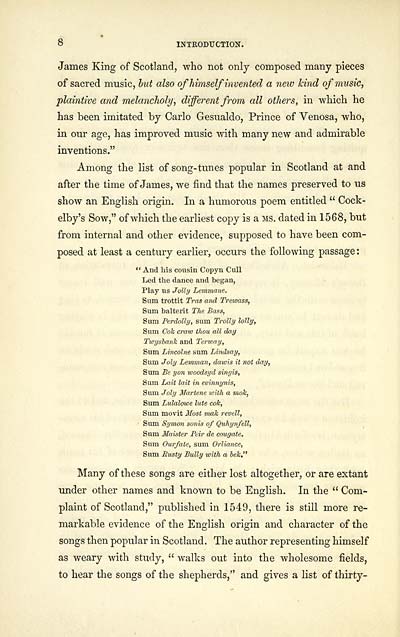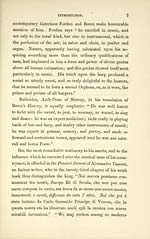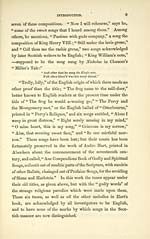Glen Collection of printed music > Printed text > Illustrated book of Scottish songs from the sixteenth to the nineteenth century
(24) Page 8
Download files
Complete book:
Individual page:
Thumbnail gallery: Grid view | List view

8 INTEODUCTION.
James King of Scotland, who not only composed many pieces
of sacred music, hut also of himself invented a new kind of music,
plaintive and melancholy, different from all others, in whicli lie
has been imitated by Carlo Gesnaldo, Prince of Venosa, who,
in our age, has improved music with many new and admirable
inventions."
Among the list of song-tunes popular in Scotland at and
after the time of James, we find that the names preserved to us
show an English origin. In a humorous poem entitled " Cock-
elby's Sow," of which the earliest copy is a ms. dated in 1568, but
from internal and other evidence, supposed to have been com-
posed at least a century earlier, occurs the following passage :
•* And his cousin Copyn Cull
Led the dance and began,
Play us Jolly Lemmane.
Sum trottit Tras and Trewass,
Sum halterit The Bass,
Sum Perdolly, sum Trolly lolly,
Sum Coh craw thou all day
Twyshank and Terway,
Sum Lincolne sum Lindsay,
Sum Joly Lemman, dawis it not day,
Sum Se yon woodsy d singis,
Sum Lait lait in evinnynis,
Sum Joly 3Iartene loith a moJc,
Sum Lulalowe lute cok,
Sum movit Most mak revell,
Sum Symon sonis of Quhynfell,
Sum Maister Feir de couyate.
Sum Our/ate, sum Orliance,
Sum Busty Bully with a hek,"
Many of these songs are either lost altogether, or are extant
under other names and known to be English. In the " Com-
plaint of Scotland," published in 1549, there is still more re-
markable evidence of the English origin and character of the
songs then popular in Scotland. The author representing himself
as weary with study, " walks out into the wholesome fields,
to hear the songs of the shepherds," and gives a list of thirty-
James King of Scotland, who not only composed many pieces
of sacred music, hut also of himself invented a new kind of music,
plaintive and melancholy, different from all others, in whicli lie
has been imitated by Carlo Gesnaldo, Prince of Venosa, who,
in our age, has improved music with many new and admirable
inventions."
Among the list of song-tunes popular in Scotland at and
after the time of James, we find that the names preserved to us
show an English origin. In a humorous poem entitled " Cock-
elby's Sow," of which the earliest copy is a ms. dated in 1568, but
from internal and other evidence, supposed to have been com-
posed at least a century earlier, occurs the following passage :
•* And his cousin Copyn Cull
Led the dance and began,
Play us Jolly Lemmane.
Sum trottit Tras and Trewass,
Sum halterit The Bass,
Sum Perdolly, sum Trolly lolly,
Sum Coh craw thou all day
Twyshank and Terway,
Sum Lincolne sum Lindsay,
Sum Joly Lemman, dawis it not day,
Sum Se yon woodsy d singis,
Sum Lait lait in evinnynis,
Sum Joly 3Iartene loith a moJc,
Sum Lulalowe lute cok,
Sum movit Most mak revell,
Sum Symon sonis of Quhynfell,
Sum Maister Feir de couyate.
Sum Our/ate, sum Orliance,
Sum Busty Bully with a hek,"
Many of these songs are either lost altogether, or are extant
under other names and known to be English. In the " Com-
plaint of Scotland," published in 1549, there is still more re-
markable evidence of the English origin and character of the
songs then popular in Scotland. The author representing himself
as weary with study, " walks out into the wholesome fields,
to hear the songs of the shepherds," and gives a list of thirty-
Set display mode to: Large image | Transcription
Images and transcriptions on this page, including medium image downloads, may be used under the Creative Commons Attribution 4.0 International Licence unless otherwise stated. ![]()
| Special collections of printed music > Glen Collection of printed music > Printed text > Illustrated book of Scottish songs from the sixteenth to the nineteenth century > (24) Page 8 |
|---|
| Permanent URL | https://digital.nls.uk/90348871 |
|---|
| Description | Scottish songs and music of the 18th and early 19th centuries, including music for the Highland bagpipe. These are selected items from the collection of John Glen (1833 to 1904). Also includes a few manuscripts, some treatises, and other books on the subject. |
|---|
| Description | The Glen Collection and the Inglis Collection represent mainly 18th and 19th century Scottish music, including Scottish songs. The collections of Berlioz and Verdi collected by bibliographer Cecil Hopkinson contain contemporary and later editions of the works of the two composers Berlioz and Verdi. |
|---|

